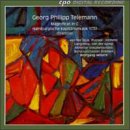| All Artists: Georg Philipp Telemann, Wolfgang Helbich, Bremen Baroque Orchestra, Mieke van der Sluis, Wilfried Jochens, Philip Langridge Title: Telemann: Magnificat in C; Hamburgische Kapitšnsmusik 1730 Members Wishing: 0 Total Copies: 0 Label: Cpo Records Release Date: 1/25/1995 Genre: Classical Styles: Opera & Classical Vocal, Chamber Music, Historical Periods, Baroque (c.1600-1750), Classical (c.1770-1830) Number of Discs: 1 SwapaCD Credits: 1 UPC: 761203910922 |
Search - Georg Philipp Telemann, Wolfgang Helbich, Bremen Baroque Orchestra :: Telemann: Magnificat in C; Hamburgische Kapitšnsmusik 1730
 | Georg Philipp Telemann, Wolfgang Helbich, Bremen Baroque Orchestra Telemann: Magnificat in C; Hamburgische Kapitšnsmusik 1730 Genre: Classical
|
Larger Image |
CD Details |
CD ReviewsA voice teacher and early music fan George Peabody | Planet Earth | 03/13/2010 (5 out of 5 stars) "GEORG PHILIPP TELEMANN: UNJUSTLY NEGLECTED MASTER OR A SUPERFICIAL CRAFTSMAN?
Georg Philipp Telemann (1681-1767) was a German Baroque composer, often described as the most prolific composer in history (at least in terms of his surviving works) a contemporary of J.S.Bach and a lifelong friend of G.F. Handel. He traveled widely, absorbing various musical styles and incorporating them into his own compositions. Telemann was highly respected during his lifetime, and for several decades after; however, by the first decade of the 19th century his works were performed less frequently. The revival of interest in him began in the first decade of the 20th century with the result that there are now many recordings of his music. Telemann composed with some facility and fluency in a variety of styles. He prided himself on taking on the characteristics of every national style, writing in what was then called the new style galant. Opinion is divided as to whether Telemann is an unjustly neglected master or a superficial craftsman whose work lacks depth and profundity because of his incredible productivity. Unquestionably, he had an effortless melodic gift and wrote music of great charm. His 12 Methodischen Sonate (1732) provide many valuable examples of ornamentation that are particularly useful today, when the art of improvised ornamentation is rare indeed except perhaps in Jazz. The 'MAGNIFICAT IN C MAJOR' - My soul magnifies the Lord: thus the beginning of the first and probably the best known of the four 'Greater Canticles' in the Gospel of Luke in the New Testament. It is Mary's song of thanksgiving for having been chosen to be the mother of the longed-for Messiah that the Evangelist transmits in these verses (Luke 1.46-55). Like the Psalms, this canticle was initially sung monophonically, but the introduction of polyphony during the 15th century resulted in the composition of polyphonic settings. This was an early work in Telemann's career (between 1701-1705), which seems still to bear many a trace of the influence of German and Italian church music from around 1700. This work has an impressive melodic design combining lively rhythmic accentuation and precise declamation as well as engaging expressive harmonic structure. It is scored for Vocal soloists, Choir and Orchestra. It is rather short being only 18 min, 34 seconds, and I enjoyed every minute of it! 'Exalt, rejoice and sing!' This oratorio from 'KAPIITANSMUSIC 1730'(captain's music) has nothing nautical about it, having been written for an annual gala of the Hamburg Militia. This festal baroque music was not composed for feudal pomp and show but to be enjoyed by free citizens. Telemann, himself, wrote the text for this work, and thus we have an excellent example of Telemann the composer-poet and a signal instance of his enlightened optimistic outlook. In this work we have, besides several different choruses, allegorical figures: Joy, Truth, Gratitude and Mournfulness. The soloists are outstanding in both selections: Mieke van der Sluis(soprano), Graham Pushee (male alto), Wilfried Jochens (tenor), Phillip Langshaw and Harry von der Kamp (basses). The Alsfelder Vokolensemble and the Barockorchestor Bremen under the direction of Wolfgang Helbich acquit themselves very well indeed! An enjoyable listening treat! A quotation from the AMERICAN RECORD GUIDE (Wm. Gateus):"I was particularly impressed with the Australian countertenor, Graham Pushee and tenor Wilfried Jochens (a native of Hamburg). Both men have clear, substantial, yet flexible voices and can manage Telemann's roulades with seeming effortlessness - make real music of them. They are also impressive in more sustained lines". My sentiments exactly!! The CD is accompanied by an informative booklet with liner notes in German, English and French. The text is in Latin, German and English." |

 Track Listings (31) - Disc #1
Track Listings (31) - Disc #1